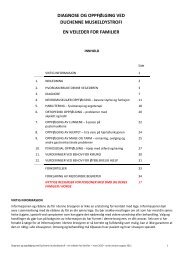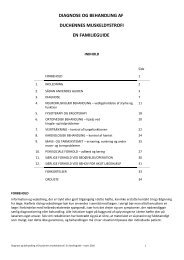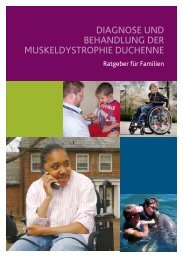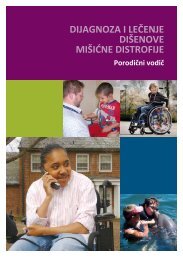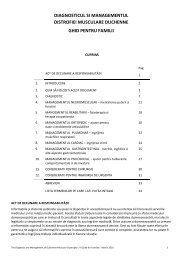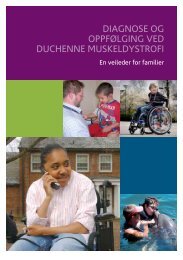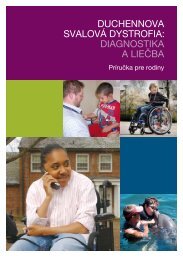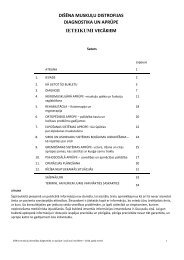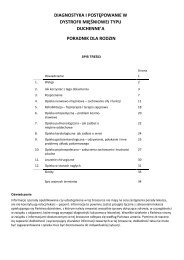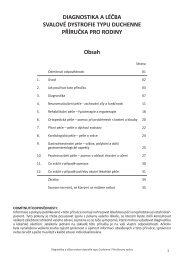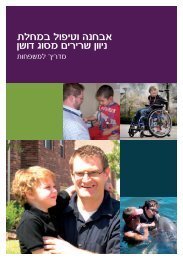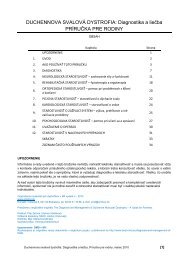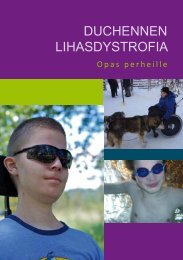Jos Hendriksen - CARE-NMD
Jos Hendriksen - CARE-NMD
Jos Hendriksen - CARE-NMD
You also want an ePaper? Increase the reach of your titles
YUMPU automatically turns print PDFs into web optimized ePapers that Google loves.
BUDAPEST april 18th 2013<br />
THE PSYCHOLOGY OF<br />
DUCHENNE<br />
Kempenhaeghe<br />
Centre of neurological<br />
Learning disorders<br />
<strong>Jos</strong> <strong>Hendriksen</strong>, PhD<br />
Clinical child psychologist
Information about intelligence, learning, behavior and other<br />
psychological aspects of this muscle disease for parents,<br />
siblings, teachers, paramedics.
Starting point:<br />
introduction<br />
The average boy with Duchenne does<br />
not exist. Every boy/young man is<br />
unique with his own strenghts and<br />
deficits.<br />
Is there a characteristic psychological<br />
profile of boys/young men with DMD,<br />
with potential deficits in cognition,<br />
communication, behavior, and<br />
psychosocial functioning ?
introduction<br />
Muscle and Brain
introduction<br />
THERE IS BRAIN<br />
INVOLVEMENT IN<br />
DMD
Depletion of brain dystrophin:<br />
Brain area<br />
Cognition<br />
introduction<br />
• Hippocampus …………. memory<br />
• Cerebellum ……………. automatisation<br />
• Prefrontal cortex … planning/organisation<br />
Prefrontal<br />
cortex
Leiden – Kempenhaeghe<br />
research project:<br />
structural brain abnormalities<br />
introduction<br />
30 DMD boys + 20 Controls<br />
6+3Tesla 3D T1 and diffusion tensor imaging scans<br />
and neuropsychological testing were obtained
FOUR PSYCHOLOGICAL TOPICS:<br />
Outline<br />
1. Intelligence and cognitive functions<br />
2. Psychosocial adjustment & coping<br />
3. Neuropsychiatric comorbidity<br />
4. Transition into adulthood
PART 1:
Intelligence<br />
Intelligence<br />
“An individuals ability to adapt and<br />
constructively solve problems in the<br />
environment” (David Wechsler)<br />
130 very high
Intelligence<br />
Cotton et al 2001
<strong>Hendriksen</strong> & Schrans 2012<br />
review<br />
38 studies<br />
Intelligence
<strong>Hendriksen</strong> & Schrans 2012<br />
review<br />
Intelligence<br />
77 studies between 1954 and 2012<br />
11 studies using Wechlser scale (N= 377:<br />
295 not included in the Cotton review)<br />
Wechsler Total IQ 88 (Cotton 80)<br />
Wechsler Performance IQ 93 (Cotton 85)<br />
Wechsler Verbal IQ 88 (Cotton 80)
Association between IQ<br />
and age (Cotton 2005)<br />
Intelligence<br />
VIQ improves with age:<br />
20 years: Mean = 86<br />
GROWING OUT OF DEFICIT<br />
As boys grow older they grow out of a verbal<br />
deficit
Child neuropsychology<br />
Strenghts and deficits<br />
COGNITIVE FUNCTIONS<br />
Profile of strengths and deficits ?
Raven progressive matrices<br />
Strenghts and deficits<br />
Look at the pattern carefully: which of these pieces goes in there?<br />
Logical reasoning:<br />
DMD boys do not<br />
differ from their<br />
controls
Raven progressive matrices<br />
Strenghts and deficits<br />
Look at the pattern carefully: which of these pieces goes in there?
Strenghts and deficits<br />
Boy 9 years
WEAKNESS:<br />
Expressive Language<br />
Strenghts and deficits<br />
•Delayed language development;<br />
•Language fluency (on command<br />
speech) may be more affected;<br />
•This may result in poor reading<br />
performances (40% in DMD)
Short term memory<br />
deficits<br />
Strenghts and deficits<br />
Wicksell et al (2004):<br />
The short term memory deficits might<br />
play a critical role in the cognitive<br />
impairment and intellectual development.<br />
Controls<br />
DMD
Attention problems: incidence<br />
Strenghts and deficits<br />
<strong>Hendriksen</strong> & Vles, N=351 (DMD boys)<br />
18,7%<br />
7,5%
Strenghts and deficits<br />
Cognitive profile:<br />
a summary<br />
Weaknesses Strenghts<br />
expressive language<br />
working memory<br />
attention<br />
visuospatial<br />
rote memory
Education<br />
Cognitive functioning<br />
Majority of the boys visit normal school<br />
(Holland N=216)<br />
62% normal school<br />
8% school for disabled children<br />
5% school for mentally retarded.<br />
www.leraar24.nl/video/2735
PART 2:
Normal development<br />
Behaviour in developmental<br />
perspective<br />
Normal stressors<br />
First school<br />
day<br />
Falling down<br />
First bad<br />
grade<br />
Being rejected<br />
Become<br />
wheelchair<br />
dependent<br />
Illness related stressors
Psychosocial adjustment<br />
DMD and coping<br />
How do boys and young men with<br />
duchenne adjust to their illness?
Psychosocial adjustment<br />
This is the first study to<br />
compare psychosocial<br />
adjustment of a large sample<br />
of patients with DMD to<br />
findings reported in males<br />
with other chronic conditions
Psychosocial adjustment<br />
Psychosocial<br />
adjustment can be<br />
defined as the<br />
adaptive task of<br />
managing upsetting<br />
feelings and<br />
frustrations aroused<br />
by the illness, and<br />
preserving an<br />
emotional balance.
Psychosocial adjustment<br />
PARS-III<br />
Psychosocial<br />
adjustment<br />
High score<br />
reflect<br />
better<br />
adjustment.
Psychosocial adjustment<br />
Six domains of psychosocial<br />
adjustement<br />
1. Peer relations: making friends of his own<br />
2. Dependency: asking for help<br />
3. Hostility: responding to discipline<br />
4. Productivity: keeping up with tasks<br />
5. Anxiety/depression: acting afraid<br />
6. Withdrawal: unaware of things going on
Psychosocial adjustment<br />
parstot<br />
Developmental profile: overall<br />
adjustment scores<br />
95<br />
n=322<br />
90<br />
85<br />
80<br />
3 4 5 6 7 8 9 10 11 12 13 14 15 16 17 18 19 20 21 22 23 27 30<br />
age<br />
As boys grow older, they grow into better adjustment
Psychosocial adjustment<br />
1.Peer relations<br />
Made friends without difficulty/<br />
Joined others of own accord<br />
Better<br />
adjustment<br />
Lower<br />
adjustment<br />
peer relations<br />
11<br />
10<br />
9<br />
8<br />
Correlation with<br />
age -.12 *<br />
3 4 5 6 7 8 9 10 11 12 13 14 15 16 17 18 19 20 21 22 23 27 30<br />
age<br />
n=340
Psychosocial adjustment<br />
3.Hostility<br />
Ignored warnings to stop unacceptable behaviour/<br />
Did not respond to discipline<br />
Better<br />
adjustment<br />
hostility<br />
22<br />
20<br />
18<br />
Correlation with age<br />
+.38 ***<br />
n=342<br />
Lower<br />
adjustment<br />
3 4 5 6 7 8 9 10 11 12 13 14 15 16 17 18 19 20 21 22 23 27 30<br />
age
Psychosocial adjustment<br />
5.Anxiety / depression<br />
Said people didn’t care about him/<br />
Said he couldn’t do things right<br />
Better<br />
adjustment<br />
anxiety_depress<br />
22<br />
21<br />
20<br />
Correlation with age .04 NS<br />
n=344<br />
Lower<br />
19<br />
adjustment 3 4 5 6 7 8 9 10 11 12 13 14 15 16 17 18 19 20 21 22 23 27 30<br />
age
Psychosocial adjustment<br />
Profile of strengths and<br />
weaknesses<br />
Percenti le s cores: Individual profil e of domains of psychosocial adjustment<br />
Peer Depen- Hostility Productivity Anxiety/ Withdrawal PARS-III<br />
rel ati ons dency depression Total score<br />
Maximum s core 16 16 24 16 24 16 111<br />
Mean score 9,03 12,18 19,22 10,45 20,16 14,41 85,34<br />
Standard deviation 1,17 2,38 4,08 2,92 3,04 1,95 12,18<br />
Percentile 10 5 9 13-14 7 16 12 68-74<br />
Percentile 20 6 10 15 8 17 13 75-76<br />
Percentile 25 7 11 16 8 18 13 77-78<br />
Percentile 30 7 11 17 9 19 14 79-83<br />
Percentile 40 8 12 18-19 9 20 15 84-86<br />
Percentile 50 9 12 20 10 21 15 87-89<br />
Percentile 60 10 13 21 11 21 16 90-92<br />
Percentile 70 11 14 22 12 22 16 93<br />
Percentile 75 12 14 23 13-14 23 16 94-95<br />
Percentile 80 12 14 23 13-14 23 16 96-99<br />
Percentile 90 13 15 24 15 24 16 100<br />
strenghts<br />
weakness
Psychosocial adjustment<br />
Boys with DMD do not appear to be<br />
at significant greater risk for<br />
adjustment problems than boys with<br />
other chronic conditions
Psychosocial adjustment<br />
No difference in psychosocial<br />
adjustment between boys who<br />
are taking steroids (N=161) as<br />
compared with those who were<br />
not on steroids (N=118)
Psychosocial adjustment<br />
Norm referenced data suggest<br />
that a score below the cutt-off<br />
point of 72 indicates a higher<br />
risk for psychosocial<br />
adjustment.<br />
These boys need further<br />
comprehensive evaluations.
Neuropsychiatry
Neuropsychiatry<br />
Neuropsychiatric problems:<br />
Is there a comorbidity?<br />
YES
Neuropsychiatry
Prevalence ASD (Autism Spectrum<br />
Neuropsychiatry<br />
Disorders) in DMD<br />
Three studies on Autism and DMD:<br />
Wu et al (2005) =<br />
3,7%<br />
<strong>Hendriksen</strong> & Vles (2008)= 3,2%<br />
Hinton et al (2009)=<br />
15-19%<br />
Wu, Kuban, Allred, Shapiro & Darras (2005). Association of Duchenne Muscular Dystrophy with autism<br />
spectrum disorders. Journal of childneurology, , 20 (10): 790-795.<br />
<strong>Hendriksen</strong>, Normal J.G.M. & Vles, population J.S.H (2008). Neuropsychiatric = disorders in males with Duchenne 0,16% musucular<br />
Dystrophy. Journal of childneurology, 23 (5): 477-81<br />
Hinton V& Cyrulnik SE (2009). Association of autism with dystophinopathies. Pediatric Neurology, 41 (5); 339-<br />
46.
Neuropsychiatry
ADHD in DMD<br />
Neuropsychiatry<br />
Italian boys (Pane et al, 2012; N= 103)<br />
DSM-IV criteria and Conners<br />
questionnaires<br />
ADHD/ADD = 36%<br />
–ADHD = 18%<br />
–ADD = 12%<br />
–HYP = 3%<br />
Pane M, Lombardo ME et al (2012). Attention deficit hyperactivity disoder and cognitiev<br />
function in Duchenne muscular dystrophy: phenotype-genotype correlation. The journal of<br />
pediatrics, 161, 705-709
Relation with steroids?<br />
Neuropsychiatry<br />
The diagnosis of ADHD was<br />
independent of Total IQ and<br />
not associated with<br />
ambulation and steroids<br />
regime (Pane et al 2012)
DMD and ADHD in our clinic<br />
Neuropsychiatry<br />
12 boys (6.5 year) DMD with learning<br />
problems;<br />
Verbal IQ 85; Performance IQ 104;<br />
67% normal education,<br />
25% repeated a grade;<br />
6 boys (50%) with ADHD and on ritalin<br />
medication;<br />
Positive effect ritalin in 83% (N=5).
Transition<br />
an emerging and novel patiënt<br />
population<br />
PART 4:
Transition<br />
Amsterdam expert meeting june 2011
Transition
Priority of factsheets<br />
Transition<br />
1. Taboos (predictable but unspeakable)<br />
2. Start early<br />
3. Personality type<br />
4. Medical Watershed moments
Taboos: Facilitating open conversation<br />
This fact sheet will help you and others talk about subjects that are difficult<br />
or uncomfortable to express. Topics such as sex and romance, mortality<br />
(which is the fancy word for death), guilt that you may feel having MD, or<br />
guilt that your parents may feel in taking time for themselves over your<br />
condition, and also losing abilities you once had and how it is going to be in<br />
the future. It is ok to feel angry with MD, and also sad or bummed out. It is<br />
ok and it is normal. It is even ok to cry sometimes. What is important is that<br />
you learn how to cope, and eventually manage your own life. You will also<br />
feel happy, success, and feelings of accomplishment. Having MD is not all<br />
bad!<br />
General tips for mom and dad:<br />
•Start early in life.<br />
•Initiate conversations with your child.<br />
•Create an open environment.<br />
•Communicate your own values.<br />
•Listen to your child.<br />
•Try to be honest.<br />
•Be patient.<br />
•Use everyday opportunities to talk.<br />
•Don’t forget friends, talk with them too!<br />
.<br />
The topics below can be tough to talk about, and the boxes at the bottom provide some answers and conversation starters so that discussion can<br />
be open and honest. Your feelings are ok; don’t be afraid to share them and talk about why you feel as you do.<br />
SEX<br />
GUILT<br />
MORTALITY<br />
DECLINE<br />
OF<br />
ABILITY<br />
1. Real life is NOT like the movies. You don’t meet someone and end<br />
up in bed a few hours later. Time is spent going to the movies, out to<br />
eat, and getting to know someone. Sex is a difficult topic to talk about<br />
even if you are not disabled. When you begin dating, be open to<br />
talking about your feelings about sex, and what you might need help<br />
doing.<br />
2. Guilt is around when you have a disability. Maybe you feel guilty<br />
asking people for assistance, maybe your family feels guilty about all<br />
the pressure they put on themselves to make sure you are ok. Do<br />
they ignore their own lives? Do your siblings feel guilt toward you or<br />
themselves? Remember, all feelings are normal, and it is even ok to<br />
talk about conflict and the role of everyone in your house. Everyone<br />
needs to have a life; not just you. Be patient, and talk, talk, talk.<br />
1. Mortality is another subject that can be scary. Everyone knows that<br />
they are going to die, but not everyone believes it. As we all get<br />
older, it is something that we all think about, but love does not die.<br />
We don’t stop loving someone when they pass away. All of us have<br />
limited time on the Earth. Talking about death is also healthy. Even<br />
though it is going to happen someday, people that are happy in life<br />
always have the same outlook: Do the best you can while you are<br />
here!<br />
2. Losing ability is like going through phases of grief: anger, denial,<br />
realization, acceptance. As you go through the cycle, you understand<br />
that it happens over and over when you can’t do something anymore.<br />
How to deal? Perspective. Using a power chair? Now you CAN do<br />
things by yourself that you couldn’t do before. The list goes on and<br />
on.
THEME 2: Start thinking about<br />
transition early<br />
Transition<br />
Teach skills for independence early<br />
and start transition at the earliest<br />
developmentally appropriate time.<br />
Individually accustomed care which should<br />
ideally be goal directed, easily accessible,<br />
simple and outpatient
THEME 3: Patient types and<br />
coping with DMD<br />
Transition<br />
Guide adolescents to the front seat<br />
of their own care and take an<br />
individual role in the ongoing process<br />
of transition.
Transition
Patient Types and Coping Strategies<br />
This fact sheet is meant to guide you in being in charge of your own care.<br />
In our experience some doctors tend to talk to parents instead of the<br />
main person. This main person is you! As a result you may not be in<br />
charge of your own care. In order to force doctors to talk to you instead<br />
of your parents and in getting more independent from your parents while<br />
getting older we designed this fact sheet. It is supposed to inform you<br />
and offer practical tips in getting in charge concerning medical issues,<br />
psychological issues, and social environmental issues in your own care.<br />
Why do we think it is important to be in charge of your own care? In<br />
explaining this we want to make a comparison with “boatsmen”. The<br />
name boatman refers to the one who gives instructions to the sailors on<br />
the deck of a ship. He usually has sailed big waters and bears great<br />
storms. As with the boatman’s life, the life of a man with Duchenne, is<br />
determined to the extend he is able to give instructions and organize his<br />
environment. To be able to do this in a satisfying way he needs to be<br />
recognized and be in charge of his own care.<br />
In taking charge, you first have to ask yourself how well each profile below matches you?<br />
- not at all, not really, a little, well, very well -<br />
A B C D<br />
If profile A, B or D suits you best you might use some help in getting in<br />
charge of your own care.<br />
Our goal is to let you make your own decisions and not let your illness<br />
limit you. If you do so, you’re in charge of your own care! For those of<br />
you who haven’t (yet) but want to, we will give some tips.<br />
• Stop worrying about your disease or health<br />
• Stop thinking your disease permits you living a normal life<br />
• If you want something to happen: be at the helm of your own care and take your<br />
own responsibility<br />
• Accept help from others if needed or offered<br />
• Believe that you are able to manage your own care<br />
• Think for your self and do what suits you best; don’t accept every tip or advice<br />
others give you ;)<br />
But if you do so you’ll notice the effects described alongside <br />
If profile C suits you best, you’re already in charge of your own care.<br />
You may recognize the characteristics below. These characteristics are of<br />
great importance in getting more independent and in charge of your own<br />
life and care.<br />
• Living easy now is more important than being completely compliant<br />
• It’s you who decides how to live; don’t let your disease limit you in<br />
daily life<br />
• Dare to discuss your own opinion with others, including medical<br />
professionals<br />
• You are capable of doing that yourself, you know enough about it<br />
• You want to be treated like an adult and do your own talking<br />
• You don’t need your parents for that<br />
• No one needs to hold your hand, but you may find it convenient to<br />
get information<br />
• This does not mean you will always use it though!<br />
Literature: Jedeloo, S, AL Van Staa, JM, Latour, J van Exel (2009) Preferences for Health Care and Self-Management among Dutch Adolescents with Chronic Conditions: A<br />
Q-Methodological Investigation. International Journal of Nursing Studies doi:10.1016/ j.ijnurstu.2009.10.006.
THEME 4: Medical watershed<br />
moments<br />
Transition<br />
Crisis = opportunity:<br />
- Loss of daily activities;<br />
- Repercussion of scoliosis surgery;<br />
- Ventilator: energy and restrictions;<br />
- From pediatric to adult care.
Documentary<br />
Duchenne with a Future<br />
The Power to Live<br />
<strong>Jos</strong> <strong>Hendriksen</strong>, Debby Schrans, Jelle de Jonge<br />
Elizabeth Vroom, Pat Furlong (2011)
Documentary
Documentary<br />
Duchenne with a Future<br />
The Power to Live<br />
<strong>Jos</strong> <strong>Hendriksen</strong>, Debby Schrans, Jelle de Jonge<br />
Elizabeth Vroom, Pat Furlong<br />
• Interviews with 8 Duchenne men and 5 experts<br />
• 4 countries: USA, Danmark, Belgium, Netherlands<br />
• 18 Discs of filmingl, each 45 min.<br />
hendriksenj@kempenhaeghe.nl
Documentary<br />
A positive message:
Concluding remark<br />
There is a close interrelationship<br />
between physical and psychological<br />
issues that characterize DMD;<br />
There is urgent need for multidisciplinary<br />
approaches in the context<br />
of contemporary medical management<br />
and improved survival
Thank You for your attention<br />
<strong>Jos</strong> <strong>Hendriksen</strong>:<br />
<strong>Hendriksen</strong>J@kempenhaeghe.nl<br />
•Questions?<br />
•Comments?



